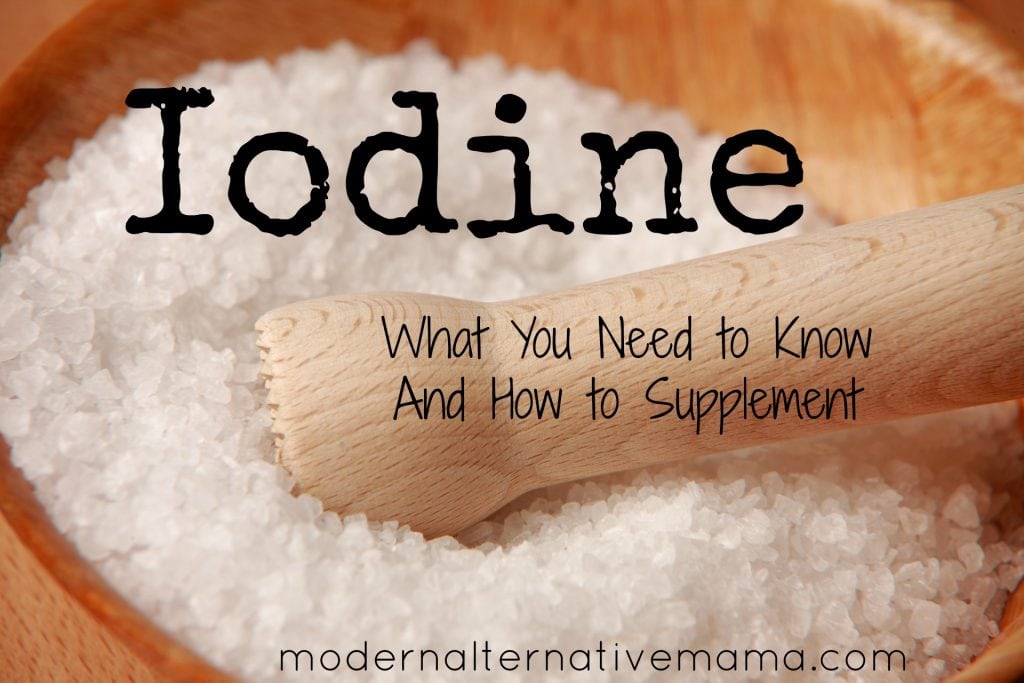Most think of a yellow umbrella and can of salt when they think of iodine. But the element is much more than that. Contributing writer, Danielle, shares with us how this element is essential to many body functions, and that a deficiency can spell serious health effects.
Iodine: What You Need and How to Supplement
Iodine is an element that is essential to important bodily functions, the most important being thyroid function. Every organ in the body contains iodine, but the tissues which require it are the thyroid, breast, skin, pancreas, salivary glands, thymus, brain and stomach. Over half of the population is iodine deficient, so it’s likely that your family may need to check their levels of this important element.
Iodine is not made by the body, so it must be derived from the diet. Without it, the body cannot regulate hormones through the thyroid. The thyroid produces hormones which manage many of the body’s functions.
What are symptoms of iodine deficiency?
Iodine deficiency is a rampant issue in the U.S. today because of several factors, including depleted soil and a lack of iodine-rich foods in the diet. High exposure to bromine (in processed bread products and soda) and fluoride (added to city water supply and tooth hygiene products) also depletes iodine, contributing to a deficiency. Iodine is especially important during pregnancy, and has been linked to numerous disorders. Iodine deficiency has even been linked to autism and mental retardation.
Before iodized salt became available, there was a serious deficiency in the Northwestern, Great Lakes and Appalachian states. As families have moved to a processed diet, this particular deficiency in developed countries is making a come back.
Here are some common symptoms of iodine deficiency:
- Skin – dry skin or lack of sweating
- Dry mouth
- Brain – lowered IQ and focus issues
- Muscles – increased pain and poor muscle recovery
- Unexplained weight gain
- Thyroid issues, including enlarged thyroid
Since it is critical in thyroid function, a deficiency can spell serious issues. Many who suffer from hypothyroidism also have an iodine deficiency.
How can you supplement?
You can increase intake by keeping a healthy, unprocessed diet full of raw fruits and vegetables, while adding dairy and fish. You can also supplement topically or ingest a supplement.
The recommended daily allowance is:
- 150 micrograms (mcg) per day for adult men and women
- 220 mcg for pregnant women
- 290 mcg for lactating/breastfeeding women
Many doctors believe that this is way too low, and more is needed to support healthy organs. A simple urine test can determine if your levels are adequate. If you are still experiencing symptoms, you may consider upping your intake with a natural supplement or iodine-rich foods.
It should be noted that it is possible to over supplement and serious health risks are possible. When supplementing, monitor your overall feelings and behavior, and obtain frequent urine testing if you are supplementing in high doses.
You can also naturally increase your levels by adding these foods to your diet:
- Organic and fresh fruits and vegetables.
- Shellfish
- Dairy products
- Iodized salt
- You can also avoid bromine (processed bread products and soda) and fluoride (added to city water supplies and tooth hygiene products) to keep the iodine in your body longer.
There are many types of iodine supplements available. You can ingest or apply it topically. When applied topically, it will absorb through the skin in the amount the body needs. Lugol’s iodine is the preferred type for topical supplementation. Potassium iodide tablets or a liquid form may also be ingested.







